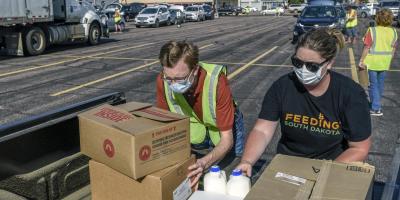Health

More on Health
WASHINGTON – A bipartisan group of Education and Labor Committee Members introduced legislation today to strengthen federal efforts to prevent and treat the harmful impacts of child abuse. The Stronger Child Abuse Prevention and Treatment Act (Stronger CAPTA) includes bold, bipartisan reforms that will help states combat the uptick in child abuse and neglect.
Washington, D.C. – U.S. Representative Dusty Johnson (R-S.D.) announced he will wait to receive the COVID-19 vaccine following a statewide poll asking when he should receive his shot. Members of Congress were offered early access to the vaccine, and the poll was intended to increase discussion about the ongoing COVID-19 vaccine distribution in South Dakota.
Washington, D.C. – On Friday evening, a bipartisan, bicameral surprise billing agreement was announced by the House Ways and Means Committee, the House Energy and Commerce Committee, the House Education and Labor Committee, and the Senate Health Committee. Surprise billing has been a priority of U.S. Representative Dusty Johnson (R-S.D.) during his first term and this package will be included in an end of year omnibus bill.
WASHINGTON, D.C. – U.S. Representatives Abigail Spanberger (D-VA-07) and Dusty Johnson (R-SD-AL) today pushed congressional leadership to pass their bipartisan Securing Affordable Vaccines Equally (SAVE) for Seniors Act to make sure seniors on traditional Medicare have access to a future COVID-19 vaccine without cost-sharing.
Washington, D.C. – U.S. Representatives Dusty Johnson (R-SD) and Abigail Spanberger (D-VA) introduced the Securing Affordable Vaccines Equally (SAVE) for Seniors Act, bipartisan legislation that would ensure seniors on traditional Medicare have access to a future COVID-19 vaccine without cost-sharing.
WASHINGTON, D.C. — Today, U.S. Representatives David B. McKinley, P.E., (R-W.Va.), Diana DeGette (D-CO), Greg Gianforte (R-MT), Peter Welch (D-VT), Dusty Johnson (R-SD), and Doris Matsui (D-CA), led a group of 243 Members of Congress in sending a letter to the United States Department of Health and Human Services (HHS) Secretary Alex Azar requesting an immediate response is taken to ensure covered safety net providers continue to receive crucial 340B drug discounts. |
At the beginning of the pandemic, Congress passed the Families First Coronavirus Response Act – this bill authorized a critical pandemic program for American families – the Farmers to Families Food Box. Since March, more than 62 million families across the country have received food boxes.
Mitchell Daily Republic
Rep. Dusty Johnson stood in the Slumberland parking lot late Wednesday afternoon, preparing for a shift of helping out with the latest food box giveaway at the Mitchell Food Pantry.
"This is where the rubber really hits the road," Johnson told the Mitchell Republic. "This is where all the lofty ideas in Washington, D.C. actually get deployed in helping families in need."
With all eyes focused on the pandemic, whether or not kids will head back to school in August, and concerns about unemployment, it's easy to miss the wins of the week.
Prescription drug pricing has been an on-going conversation since I stepped foot in the halls of Congress last year, and this week the administration took positive action towards securing lower costs for Americans on prescription medication.
Washington, D.C. – U.S. Representatives Dusty Johnson (R-S.D.-AL) and Abigail Spanberger (D-VA-07) introduced the COVID-19 Telehealth Program Extension Act to appropriate additional funds to the Federal Communications Commission's (FCC's) COVID-19 Telehealth Program authorized by the Coronavirus Aid, Relief, and Economic Security (CARES) Act.

